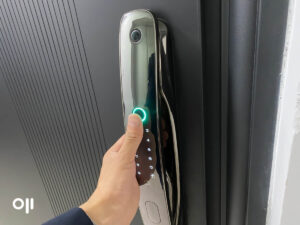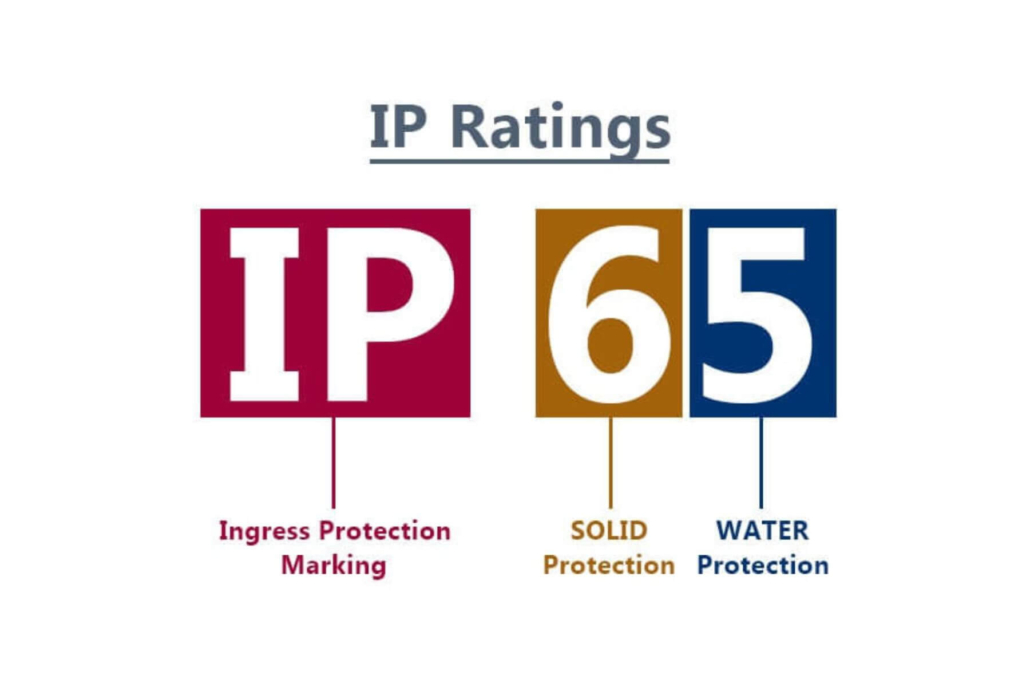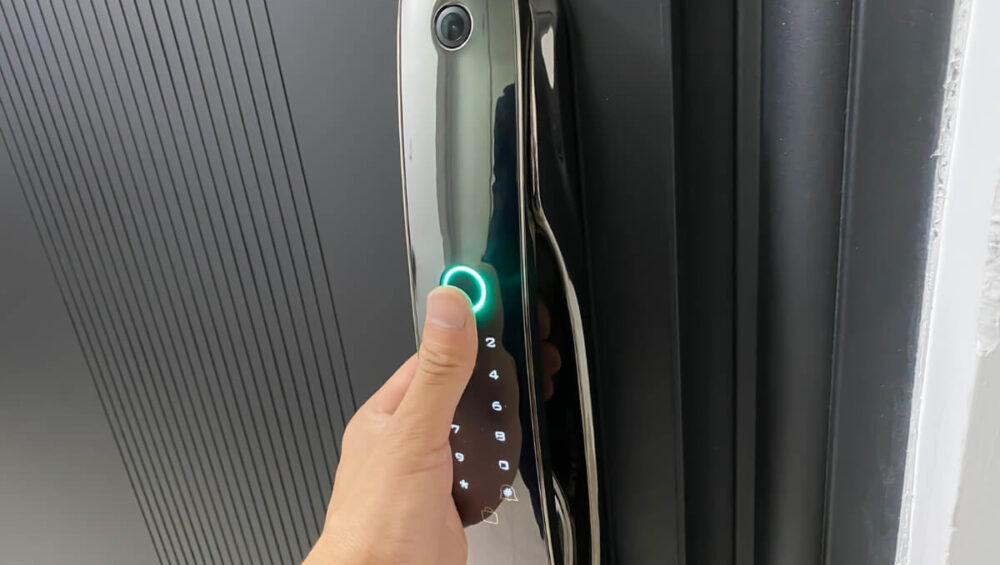The Difference Between IP65 and IP67 Smart Lock

In the ever-evolving world of technology, ensuring that devices stand the test of time, and more critically, the elements, is paramount. As a professional who has spent years both crafting copy and engineering smart locks, I’m here to demystify the difference between IP65 and IP67 ratings – crucial benchmarks for anyone considering the longevity and resilience of their smart locks.

Smart Lock: What is IP Rating?
First and foremost, “IP” stands for Ingress Protection. An IP rating is a globally accepted measure that signifies how resistant a device is to foreign substances like dust and water. These two alphanumeric characters that follow “IP” are not just random numbers; they relay critical information about the device’s toughness.
An IP rating on a smart lock indicates how well it can withstand these conditions, ensuring longevity and reliability.
For instance, if a smart lock has an IP rating of IP65, it means that it’s totally protected against dust ingress (the first digit, 6) and protected against low-pressure water jets from any direction (the second digit, 5). This level of protection is crucial for outdoor use, where the lock would be exposed to various weather conditions.
Therefore, when choosing a smart lock, understanding its IP rating helps you determine its suitability for your specific needs, especially if it’s going to be installed in an exposed location. A higher IP rating would be preferable for outdoor locks to ensure that they remain operational and secure despite environmental challenges.
Breaking Down the Numbers: IP65 vs. IP67 Smart Locks
First Digit – Solid Particle Protection:
The first number after IP indicates the level of protection a device has against solid particles, typically dust.
For an IP65 rated device, the “6” indicates total protection against dust. This means that the device is dust-tight and no particulate can infiltrate it.
For an IP67 rated device, the “6” serves the same purpose. It’s dust-tight.
Second Digit – Liquid Ingress Protection:
The second number is where IP65 and IP67 primarily differ. This number tells us about the device’s protection level against liquid intrusion.
An IP65 rated device, with its “5” rating, is protected against water jets from any direction. Picture a scenario where you’re cleaning your porch with a hose, and your smart lock installed on the outer gate gets splashed. An IP65 rating ensures the lock will remain unaffected.
IP67 goes a step further. The “7” signifies that the device can be submerged in water up to 1 meter deep for 30 minutes without any detrimental effects. Imagine a sudden downpour, or an inadvertent sprinkler incident, an IP67 lock remains unfazed.

Which One is Right for You?
Consider the Environment:
When selecting a smart lock, the importance of understanding its IP rating cannot be overstated, particularly in relation to the specific environmental conditions it will face. IP (Ingress Protection) ratings provide a clear indication of a device’s resistance against elements like dust and water. Here’s how you can apply this knowledge to choose the right smart lock for different scenarios:
Scenario 1: Occasional Rain and Splashes
Imagine you live in a region that experiences light to moderate rainfall occasionally, and the lock’s installation site is such that it might receive splashes of water—perhaps from rain getting blown onto a porch but not direct immersion. In this case, a smart lock with an IP rating of IP65 is adequate. This rating means the lock is completely protected against dust ingress (the first digit, 6) and can handle low-pressure jets of water from any direction (the second digit, 5). It’s perfect for locations where water exposure is minimal and more in the form of splashing rather than direct flow or submersion.
Suburban Home: For a suburban home with a covered porch, where the smart lock is installed on the front door, occasional splashes from sideways rain might be the most water exposure it faces. An IP65-rated lock would ensure that these conditions do not affect its functionality.
Scenario 2: Coastal Areas or Heavy Rainfall
On the other hand, if you’re in a coastal area where the air carries a lot of moisture and salt, or in a location that experiences frequent and heavy rainfalls, the demands on your smart lock’s resilience are higher. In such cases, a lock with an IP67 rating would be more appropriate. This level signifies that the lock is not only dust-tight but also capable of withstanding temporary immersion in water—between 15 cm and 1 meter deep for up to 30 minutes. This extra layer of protection is crucial in areas where the lock is likely to face more than just splashes, ensuring that heavy rains or accidental immersions don’t compromise its security features.
Beachfront Property: For a house located directly on the beach, the smart lock on the front door is exposed to a harsh mix of salt air and potential flooding from storm surges. An IP67-rated lock would offer peace of mind, knowing it can handle the occasional dunking or constant heavy, salt-laden air.
By understanding these scenarios and matching them with the corresponding IP ratings, you can make a more informed decision when purchasing a smart lock. This ensures that the lock not only meets your security needs but also stands up to the environmental challenges presented by your specific location, providing reliability and durability over time.
Smart Locks Longevity
In evaluating the ideal level of protection for your smart lock, it’s crucial to consider the specific environmental conditions it will face. For a smart lock situated in a region that experiences occasional rain showers, where the device might encounter incidental splashes of water, an IP65 rating often suffices. This rating ensures the lock is fully protected against dust ingress, which is vital for maintaining the internal components free of debris, and it also means the lock can handle low-pressure water jets from any direction. This level of protection is generally suitable for areas where water exposure is minimal and not a constant threat.
However, if the installation site is in a coastal area where the air is laden with salt mist, or in a region subject to frequent and heavy rainstorms, a higher protection level is advisable. In such scenarios, an IP67-rated smart lock offers an enhanced level of security and durability. This rating not only guarantees the lock is completely dust-tight, but it also ensures the device can withstand temporary immersion in water of up to 1 meter deep for up to 30 minutes. This additional layer of protection is crucial in environments where the lock is likely to face more than just splashes, potentially extending the operational lifespan of your smart lock significantly.
For example, consider a homeowner living near the coast, where the lock would be exposed to salty sea breezes, or someone residing in a tropical area where torrential downpours are a regular occurrence. In these situations, an IP67-rated lock would not only offer peace of mind during adverse weather conditions but could also prevent the hassle and cost associated with frequent replacements due to corrosion or water damage. Ultimately, while an IP65-rated lock might seem adequate for most situations, opting for an IP67 rating provides that extra cushion of protection that could be crucial in extending the life and reliability of your smart lock in more demanding environments.
What are the Advantages
Dust Protection: Both IP65 and IP67 ratings guarantee that the smart lock is completely sealed against dust intrusion. This ensures that fine particles cannot enter the device, a crucial factor for maintaining its internal mechanisms and ensuring its long-term reliability.
Water Resistance:
- IP65: This rating provides robust protection against low-pressure water jets from any direction. It means the smart lock can easily handle rain splashes or water spray, making it ideal for external doors where such exposure is likely.
- IP67: Going a step further, IP67-rated locks can withstand being submerged in water up to 1 meter deep for up to 30 minutes. This level of protection is particularly beneficial in areas prone to flooding or for locations where the lock might accidentally be exposed to more significant water volumes.
Durability: The incorporation of these ratings into a smart lock’s design is a clear indication of its ability to withstand various environmental factors. This durability translates to a longer operational life and consistent performance, reducing the likelihood of malfunctions due to dust or water ingress.
Versatility: Smart locks with these IP ratings are highly versatile, suitable for a wide range of environments. Whether installed indoors or outdoors, in dry, dusty conditions or areas with high moisture, these locks perform reliably, providing security without compromise.
Maintenance: The high level of protection against dust and water ingress significantly reduces the need for frequent cleaning or maintenance. This not only saves time but also minimizes the potential for damage during maintenance activities, ensuring the lock remains in optimal condition for longer.
Peace of Mind: Knowing that your smart lock is equipped to handle common environmental challenges offers invaluable peace of mind. Users can be confident that their lock will remain functional and secure, regardless of the weather or other external factors.
Conclusion
In today’s digitally driven era, where technology plays a pivotal role in enhancing our security, grasping the significance of IP ratings becomes crucial. Opting for a smart lock with either an IP65 or IP67 rating is not just a choice; it’s a commitment to resilience, durability, and protection against nature’s unpredictability. These ratings symbolize more than just numbers; they represent a shield designed to withstand everything from gentle rain showers to the rigors of a desert storm, ensuring that your property’s first line of defense remains unyielding.
Choosing a smart lock from Oji Smart translates into selecting a device crafted with meticulous attention to these very details. Oji Smart locks embody the fusion of advanced technology with the assurance of high environmental resistance, offering not only robust security but also peace of mind in knowing that your home or business is safeguarded under all conditions.

